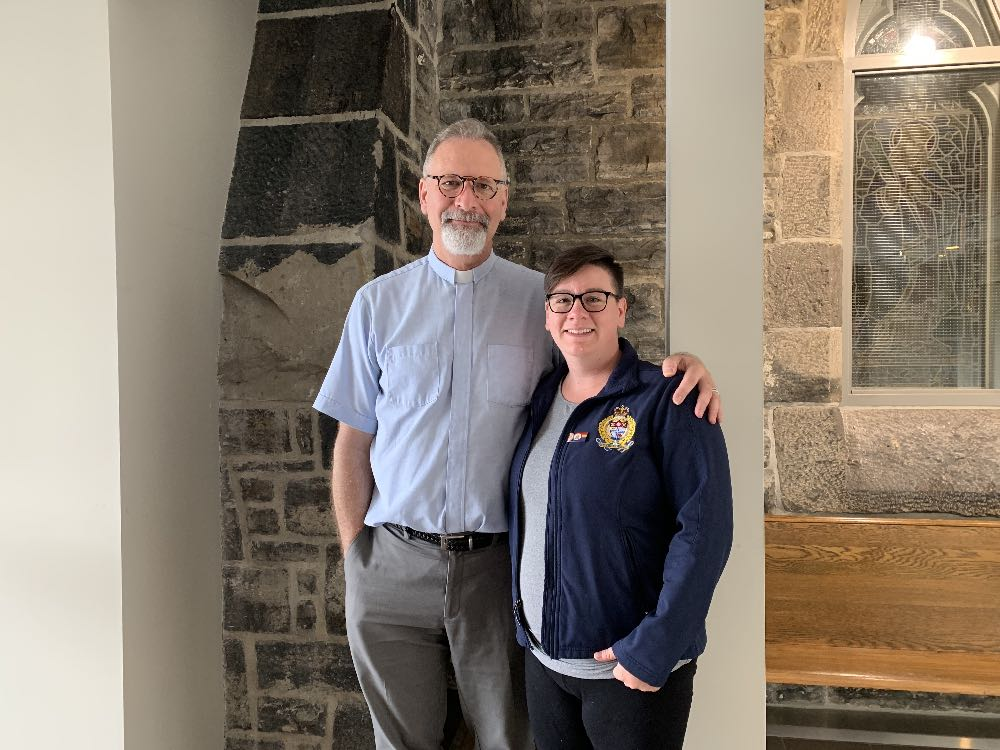Part of Christ Church Cathedral’s mission is to be a meeting place for the community in the Anglican Diocese of Ottawa. In recent years, it has served as a space where representatives of various groups in 2SLGBTQQIA+ (Two-Spirit, lesbian, gay, bisexual, transgender, queer, questioning, intersex, asexual and all other sexual orientations and genders) community have met to talk together. They even met with members of the Ottawa Police Service (OPS), an organization with which the community has had a troubled history.
The Rev. Canon Doug Richards, vicar of the cathedral and a member of the 2SLGBTQQIA+ community, has been an important part of bringing people together for these conversations. “For a long time, we were, as a group, meeting here about every three months, because it was this safe, neutral space,” noting that there are many different groups within the 2SLGBTQQIA+ community, and so it is challenging to express their views on situations and issues.
Soon after Chief Eric Stubbs began his work as the new head of the OPS, the cathedral hosted a morning meeting between representatives of the 2SLGBTQQIA+ community and members of the OPS, including Chief Stubbs. “It was a really good day where the community got the chief’s ear for the morning,” recalls Richards. They met in the cathedral’s Great Hall, but the cathedral itself was open and available for participants if they felt stressed and wanted to take a break from the meeting. “We started the day actually with going into the cathedral and spending some quiet time in there with everybody….It’s just a beautiful sacred space,” he said. As vicar of the cathedral and someone who isn’t connected to any of the other groups in the room, Richards said he was in a good position to sum up the truths that were said during the meeting.
Such meetings and discussions are important because of a mistrust of police in the 2SLGBTQQIA+ community going back to the history of police raids of gay bars and bath houses in the 1980s and in the decades before. And any negative encounter can contribute to mistrust in the present. “As soon as you come across a police officer who is, in the heat of the moment, is not respectful of an individual, then that compounds, that gets out into the community quicker than if a person has a wonderful relationship,” Richards said.
From his conversations with the chief, Richards says he has the sense that “he really wants to make the relationship between the community and the Ottawa Police Services better.”
Constable Amanda Williams plays an important part in that effort. In 2020, the OPS began a pilot project with the aim of building relationships and strengthening communications between the OPS and the 2SLGBTQQIA+ community. Williams, who is a member of the 2SLGBTQQIA+ herself, set out to get to know people. She asked to meet Richards for coffee and they have been meeting to talk regularly ever since. She has gotten to know many other leaders in the 2SLGBTQQIA+ community in similar ways, and she helped gather leaders for the meeting at the cathedral.
Williams says she has been working to give all of the police services a human face. “It’s developing relationships with individuals and communities.”
Richards noted that now if there has been a problem, people in the 2SLGBTQQIA+ will call Williams to discuss the issue. “They phone up Amanda and they talk to her about what’s going on,” and she can contact the appropriate people in the department to get involved if necessary.
If a protest or event is planned, Williams can introduce the leaders of the group to officers that will be managing the crowds.
Getting to know Williams also helps people in the community who want to report an experience to the police. “I think folks now have a hard time distinguishing hate crimes versus hate incidents.” She explains that the criminal code is the only thing that police can use to identify a hate crime. “If the offence that occurred is not criminal in nature, it’s important that the police at least reach out and explain why something is an incident and allow the person reporting it to ask questions.” She adds that she encourages people to continue to report incidents, so that they are recorded. “We need to know those incidents because if they escalate into crimes, we are able to go back into the history to help the Crown attorneys and Attorney General to be able to decide whether hate crime charges are laid.” She added that charges can also be laid for hate-related crimes, such as mischief, property damage and assault.
When asked if the number of hate crimes is rising or if people are now reporting more, Williams says it is both. “Are hate crimes on the rise? Absolutely, you’re seeing Stats Canada providing these stats, but that means people are reporting.”
Williams adds that she tracks what’s going on in the community, locally and provincially. “And I sit on a national liaison board, so we get a better pulse of what’s going on.”
She mentions another important community outreach — the annual Human Rights Learning Forum. The event on Dec. 5, 2024, (St. Elias Banquet Centre, 750 Ridgewood Ave., Ottawa) will be the ninth year the OPS has organized and hosted the forum, which brings speakers and members of the community and the police service together to learn and discuss human rights issues.
Williams will be on leave in the coming year, but another officer will continue the outreach work with some support from Canon Richards. “It’s great work, and I see progress being made,” he says.


Saint Mary’s Church, Westmeath — Deanery of the Northwest